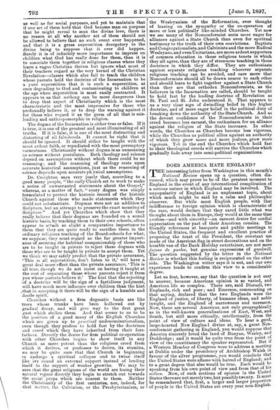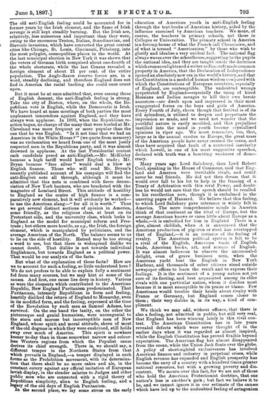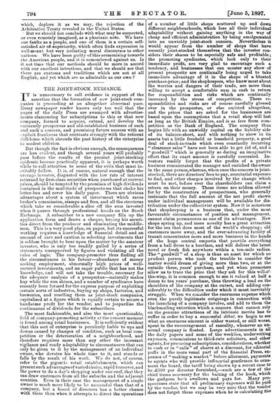DOES AMERICA HATE ENGLAND? T HE interesting letter from Washington in
this month's National Review opens up a question, often dis- cussed, which may prove to be of the greatest moment to England in the event of any international complication of a serious nature in which England may be involved. The unpopularity of England is an unpleasant topic, about which much might be said by a calm and philosophic observer. But while most English people, with that indifference to foreign opinion which is characteristic of the race, would declare that they cared little what was thought about them in Europe, they would at the same time profess—and with sincerity—an earnest desire for cordial appreciation on the part of their American cousins. The friendly references at banquets and public meetings to the United States, the frequent and excellent practice of proposing the toast of the President, the constant use made of the American flag in street decorations and on the humble van of the Bank Holiday entertainer, are not mere facons de parler, but genuine expressions of goodwill. The question suggested by the letter in the National Review is whether this feeling is reciprocated on the other side. The Washington writer says it is not, and our own experience tends to confirm this view to a considerable degree.
Let us first, however, say that the question is not easy to answer, because American opinion is so varied, and American life so complex. There are, said Disraeli, two Englands, rich and poor; and Emerson, commenting on that saying, declared that the two Englands were the England of justice, of liberty, of humane ideas, and noble insight, and the England of narrowness and unreason. Now, there are several Americas, not only geographically as in the well-known generalisations of East, West, and South, but still more ethically, intellectually, from the point of view of culture and ideas. To hear a good, large-hearted New England divine at, say, a great Non- conformist gathering in England, you would suppose that America, sincerely loved the land of Bunyan, Wesley, and Doddridge ; and it would be quite true from the point of view of the constituency the speaker represented. But if a Western Member of Congress were to address a meeting at Dublin under the presidency of Archbishop Walsh in favour of the silver programme, you would conclude that the United States were aflame with hatred of England; and to a great degree that also would be true. Each would be speaking from his own point of view and from that of his milieu. Now, of such sections of opinion in the United States there are not merely two, but possibly twenty. It must be remembered that, first, a larger and larger proportion of people in the United States are every year non-English. The old anti-English feeling could be accounted for in former years by the Irish element, and the flame of Irish revenge is still kept steadily burning. But the Irish are, relatively, less numerous and important than they were, owing to the enormous Teuton, Italian, Scandinavian, and Slavonic invasions, which have converted the great central cities like Chicago, St. Louis, Cincinnati, Pittsburg, into the most polyglot, cosmopolitan places in the world. At the last municipal election in New York it was shown that the voters of German birth comprised about one-fourth of the whole electorate, while the last Census revealed a foreign element of about 21 per cent. of the entire population. The Anglo-Saxon reserve forces are, in a word, steadily declining, and therefore England does not find in America the racial backing she could once count upon.
But it must be at once admitted that, even among those of English descent, the anti-English feeling is strong. Take the city of Boston, where, on the whole, the Re- publican vote is English, while the Democratic is Irish. We have heard at mass meetings of both parties the most unpleasant innuendoes against England, and they have always won applause. In 1893, when the Republican re- action began, no charge of the many that were hurled at Mr. Cleveland was more frequent or more popular than the one that he was English. "Is it not time that we had an American in the White House ? " (we quote from memory) was an exclamation we heard from one of the most justly respected men in the Republican party, and it was almost drowned in applause. At the last Presidential contest each candidate posed as anti-English,—Mr. McKinley because a high tariff would hurt English trade ; Mr. Bryan because " free silver " would deal a blow at English finance. Those who will read Mr. Bryan's recently published account of his campaign will find the anti-English note all through, although it must be admitted that this note is combined with fierce denun- ciation of New York bankers, who are bracketed with the magnates of Lombard Street. This attitude of hostility to England as the centre of high finance is a com- paratively new element, but it will evidently be worked— to use the American slang—" for all it-is worth." Thus we get several distinct sections of opinion in America, some friendly, as the religious class, at least on its Protestant side, and the university class, which looks to England as the model for municipal reform and Free- trade ; but others more hostile, as e.g., the Irish, the foreign element, which is manipulated by politicians, and the average American of the North. The balance seems to us to lie on the side of hostility. Hatred may be too strong a word to use, but that there is widespread dislike we cannot doubt. That dislike is not towards individual Englishmen, but towards England as a political power. That would be our analysis of the facts.
But what of the explanation of these facts? How are we to account for such a feeling, so little understood here ? We do not profess to be able to explain fully a sentiment fed from many sources, but we may hint at some of the causes. And first, one cause lies deep in history. Various as were the elements which contributed to the American Republic, New England Puritanism predominated. That Puritanism, intensely Republican in form and feeling, heartily disliked the return of England to Monarchy, even in its modified form, and the feeling, expressed at the time of the Revolution by such men as Samuel Adams, has survived. On the one hand the laxity, on the other the picturesque and genial humanism, were uncongenial to the stern and morose but incorruptible men of New England, whose spirit and moral attitude, shorn of most of the old dogmas in which they were enshrined, still holds away over much of America. This spirit is nowhere keener to-day than in those somewhat narrow and colour- less Western regions from which the Populist cause derives its chief strength. There is, we should say, a different temper in the Northern States from that which prevails in England,—a temper displayed in such forms as the Prohibition movement, with its determina- tion that there shall be no more cakes and ale, in the constant outcry against any official imitation of European lavish display, in the slender salaries to Judges and other public men who are connected with a rigid theory of Republican simplicity, alien to English feeling, and a legacy of the old days of English Puritanism. In the second place, we lay some stress on the early education of American youth in anti-English feeling through the text-books of American history, aided by the influence exercised by American teachers. We mean, of course, the teachers in primary schools, not those in Colleges or Universities. The primary school in America is a forcing-house of what the French call Chauvinism, and of what is termed " Americanism " by those who wish to glorify and idealise a very unideal fact. The national flag always waves over the schoolhouse, suggesting to the pupils the national idea, and they are taught inside the doctrines which even so enlightened a writer as Bancroft made com mon property in America, that the Declaration of Independence opened an absolutelynew era in the world's history, and that the Constitution is a model of human wisdom compared with which the Constitutions of European countries, especially of England, are contemptible. The undoubted wrongs perpetrated by England—especially the using of hired Hessians and Indian savages to kill their own heroic ancestors—are dwelt upon and impressed iu their most exaggerated forms on the boys and girls of America.
Every Fourth of July, shorn though that festival is of its old splendour, is utilised to deepen and perpetuate the impression so made, and we need not wonder that the youthful nature is easily moulded, and that prejudices instilled into the mind in youth become crystallised opinions in riper age. We must remember, too, that, large as is the annual exodus to Europe, the great mass of the American people have never crossed the ocean, and thus have acquired that fault of a contented insularity which Lowell, in one of his most suggestive speeches, declared with truth was a besetting weakness of demo- cracy.
Many years ago Lord Salisbury, then Lord Robert Cecil, speaking in the House of Commons, said that Eug- land and America were inevitable rivals, and could.
never be real friends. He did not then dream that it would ever fall to his lot to help in the framing of a Treaty of Arbitration with this rival Power, and doubt- less he would not care that the speech should be recalled to his recollection now, though it is embalmed in the unerring pages of Hansard. We believe that this feeling.. to which Lord Salisbury gave utterance is widely felt in. America. The more comprehensive minds in America think of that continent as the rival of Europe, but the average American knows or cares little about Europe as a, whole,—it is embodied for him in England There is a glee, almost childish, when it is announced that the American production of pig-iron or steel has overtopped, that of England,—it is an instance of the feeling of rivalry. The American political system is felt to be a rival of the English, American trade of English trade, American books, art, and science of English.. It was almost ludicrous to observe the unconcealed,• delight, even of grave business men, when the American yacht beat the English in New York. Harbour, and thousands of sober citizens stood outside newspaper offices to learn the result and to express their feelings. It is the sentiment of a, young nation not yet sure of its footing, and best acquainted among its elder rivals with one particular nation, whom it dislikes most because it is most susceptible to its praise or blame. Few Americans would trouble their heads about rivalry with France or Germany, but England comes closer to them ; their very dislike is, in its way, a kind of com- pliment.
We think we may add, without offence, that there is also a feeling, not admitted in public, but still very real, that England has been winning lately in this rival con- test. The American Constitution has in late years revealed defects which were never thought of in the earlier days when it was regarded as almost inspired,. while the English Constitution has proved flexible beyond expectation. The American flag has almost disappeared from the ocean, while the Union Jack floats over the globe. A policy of short-sighted exclusiveness has involved American finance and industry in perpetual crises, while English revenue has expanded and English prosperity has become the envy of a country with a hundred times greater national resources, but with a growing poverty and dis- content. We mourn over this fact, for we are not of those who hold the American Protectionist doctrine, that one nation's loss is another's gain ; but fact we believe it to be, and we cannot .ignore it in our estimate of the causes which have led up to the undoubted feeling of antagonism deplore it as we may, the rejection of the Arbitration Treaty revealed in the United. States. But we should not conclude with what may be suspected, or even remotely imagined, as a pharisaic note. We have our faults as a people, and one of them is a certain self- satisfiedair,oteuperiority, which often finds expression in well-meant but very irritating moral discourses to other national • We have been guilty-of this sermonising towards the. American people, and it is remembered against us. Is it not time that our methods should be more in accord with our excellent intentions, and that we should see that there are customs and traditions which are not at all English, and yet which are as admirable as our own ?








































 Previous page
Previous page